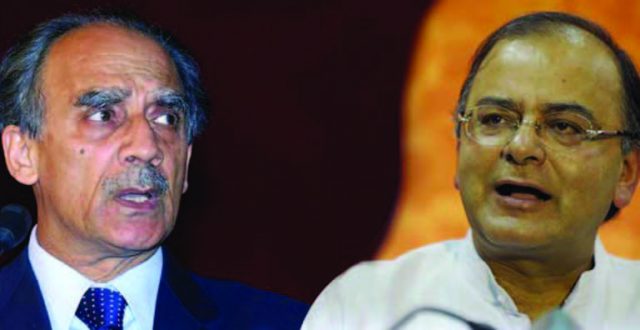NEW DELHI (TIP): The Narendra Modi-led National Democratic Alliance (NDA) is all set to form the most stable government since 1984 after winning over 60 per cent of seats in the 16th Lok Sabha. The favourable electoral verdict has unleashed a strong rally in India‘s stocks, bonds and currency.
The Sensex hit the key 25,000 levels, while the Nifty scaled the 7,500 levels on May 16, when results were announced. The rupee is trading near an 11-month high. Overseas investors have intensified buying Indian stocks and bonds and the momentum in markets is expected to continue.
The union budget, which is likely to be announced in early July, will be the next trigger for markets as it will provide an early glimpse of the new government’s policies, analysts say.
However, even before the budget announcement, markets are focused on the likely composition of the new government. While political circles are abuzz with who will get the big four ministries of home, finance, defense and external affairs, market participants are firmly focused on the next finance minister.
Barclays analysts Siddhartha Sanyal and Rahul Bajoria see Arun Jaitley as a frontrunner for the finance minister’s job. Jaitley, who was the leader of the opposition in the Rajya Sabha, is one of Modi’s close associates. “A lawyer by profession, Jaitley, like his party, is right-winged and likely to pursue a pro-reform agenda.
Thus, his appointment would likely be met with approval by markets,” Nomura’s Sonal Varma and Aman Mohunta say. Arun Shourie, a highly regarded technocrat and a former divestment minister in the previous NDA government, is the other competitor. “Shourie advocates focusing on executive announcements as a tool to restore confidence and favors fiscal consolidation,” Barclays noted. Nomura says former RBI Governor Bimal Jalan is a dark horse for the coveted post.
Some other key economy facing industries such as commerce and industries are also in focus. Former BJP president Nitin Gadkari, who is widely recognized as the person behind many infrastructure projects in Maharashtra, may be given one of the infrastructure-related ministries, given his background, Barclays noted. Subramanian Swamy, a PhD from Harvard University and a former commerce minister, could have an economic portfolio in the new cabinet, the investment bank said.
There’s also a buzz about the appointment of technocrats as junior ministers. Nomura says these technocrats will incorporate their subject matter expertise into the decision making process. “Piyush Goyal (ex-Investment Banker) and Jayant Sinha (ex-Partner, Omidyar Network) may be appointed as junior ministers in the ministry of finance,” Nomura analysts said.
Goyal is also a treasurer of the BJP, while Sinha is son of former finance minister Yashwant Sinha. E Sreedharan, widely credited for overseeing the mass rapid transit project in Delhi and other cities, could join the cabinet as railways minister to oversee the upgrading of railways and the construction of a bullet train corridor across India, a cornerstone project outlined in the BJP manifesto, Barclays noted.
Arvind Panagariya, a Columbia University professor, has openly advocated implementation on a national level of Gujarat’s best practices and could become a part of the next government or take up an advisory position. According to Nomura, he may be appointed as the chairman of the Prime Minister’s Economic Advisory Council. In the last government, this post was held by C Rangarajan.
Deepak Parekh, chairman of HDFC, could be in the running to become a part of the cabinet. He has supported Raghuram Rajan, the current RBI governor, in undertaking financial reforms, Barclays noted. Modi may induct a smaller cabinet as compared to the outgoing UPA-led government, which had 71 ministers, including 28 cabinet ministers, analysts say. He is also expected to merge several ministries to improve coordination. “The ministries of power, petroleum, coal and non-renewable energy may be merged into a single ministry of energy,” Nomura said.
